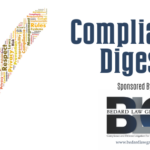I’m thrilled to announce that Bedard Law Group is the new sponsor for the Compliance Digest. Bedard Law Group, P.C. – Compliance Support – Defense Litigation – Nationwide Complaint Management – Turnkey Speech Analytics. And Our New BLG360 Program – Your Low Monthly Retainer Compliance Solution. Visit www.bedardlawgroup.com, email John H. Bedard, Jr., or call (678) 253-1871.

Every week, AccountsRecovery.net brings you the most important news in the industry. But, with compliance-related articles, context is king. That’s why the brightest and most knowledgable compliance experts are sought to offer their perspectives and insights into the most important news of the day. Read on to hear what the experts have to say this week.
Judge Dismisses FDCPA Suit for Lack of Standing, but Gives Plaintiff Chance to File New Complaint
A District Court judge has partially granted a defendant’s motion for summary judgment in a Fair Debt Collection Practices Act case and dismissed the complaint because the plaintiff lacked standing to sue, but gave the plaintiff — who raised new issues of why he has standing at the wrong time — an opportunity to file an amended complaint to cure those deficiencies. An interesting wrinkle is that the judge initially ruled the plaintiff had standing to sue even though she denied class certification, but subsequent rulings on standing led the judge to reconsider her position. More details here.
WHAT THIS MEANS, FROM PATRICK NEWMAN OF BASSFORD REMELE: I once apologized to a jury during opening statements in a secured transactions case for visiting upon them the pain and frustration that is the Uniform Commercial Code. I now similarly apologize to you, Dear Reader, that case law developments like this one have forced you to become a Constitutional Scholar regarding Article III standing, as well as an expert in federal civil procedure. It’s not the day job you signed up for, I know.
Really, the bottom line take-aways remain the same as prior updates:
- The plaintiffs’ bar continues to struggle with pleading a claim that will survive Article III scrutiny (which often comes without the defendant even raising it);
- Courts are NOT in agreement over what is or is not a concrete injury;
- Standing is an additional legal layer to the case — it’s not necessarily dispositive (a fancy legal word that just means ends the case or decides an issue).
This ride will remain bumpy for another several years, folks. Fold it into your early case evaluation and be ready for it. And, of course, continue to study the case law (sorry).
THE COMPLIANCE DIGEST IS SPONSORED BY:

Appeals Court Upholds Sanctions Against CFPB in Debt Collection Case
The Court of Appeals for the Eleventh Circuit yesterday upheld a sanctions order against the Consumer Financial Protection Bureau for “problematic” conduct during discovery of a lawsuit it filed against a number of individuals and companies alleged to have engaged in a phantom debt collection scheme, ruling that “violating the district court’s clear orders and derailing multiple depositions is nowhere near proper conduct.” More details here.
WHAT THIS MEANS, FROM JOANN NEEDLEMAN OF CLARK HILL: Sanctions against an attorney for inappropriate conduct is infrequent if not rare. It is the remedy of last resort after all reasonable efforts to enforce compliance with the rules of procedure or of the decorum that is expected of the bar. Typically sanctions are awarded in the most egregious of circumstances but the penalty is usually monetary and in very extreme instances evidence or witnesses will be precluded. That a case is completely dismissed is unheard of, especially as it relates to a governmental party. As industry has witnessed time and time again, the CFPB believes it is above the law and that the rules of discovery do not apply to them. The CFPB’s conduct in the Global Payments, Universal Debt Solutions et al case was outrageous if not shameful.
The CFPB’s attempt to thwart discovery is nothing new. In March of this year, the District Court in Rhode Island granted Citizens Bank’s Motion to Compel the deposition of three CFPB staffers and rejected the CFPB’s argument that the deposition would pose an undue burden or expense. The Judge noted:
“Overall the CFPB’s arguments strike the court as unreasonable attempts to micromanage and restrict its adversary’s discovery strategy and defense preparation”. The CFPB and Citizens settled last month for $9 million, a fraction of what the CFPB was potentially seeking.
Enforcement is not a gamble for the CFPB. A Civil Investigation Demand (CID), is a powerful tool which requires the target of an investigation to produce vast amounts of documents and information with very little opportunity for objection. The CID can also require witnesses to appear and provide oral testimony. Ironically, the rules relating to investigations and oral testimony do not even permit a witness to otherwise object or refuse to answer any question posed by the CFPB. Further, if a target of an investigation does not cooperate with the CFPB at the investigation stage, they would be subject to contempt proceedings which could include significant sanctions and penalties. As shown time and again, when an enforcement action does not result in a consent order, the CFPB loses its leverage and thus must abide by the same rules we all have to play when the matter is brought before the court. Litigation is the great equalizer.
As Director Chopra reminded us during his recent testimony before both the House Financial Services Committee and Senate Banking Committee, the “clientele of the CFPB is the public”. Based upon the CFPB’s conduct in this case, they failed to represent their “clients”. If this was a private attorney, the client would have a basis for malpractice. There is a discernible difference between zealous advocacy and disrespect to the tribunal and the rule of law. Rule 11 applies equally to attorneys who come before the court, whether they be private attorneys or CFPB enforcement attorneys, and it dictates that those who come before the court do so for a proper purpose and not to unnecessarily increase the cost of litigation. The CFPB’s conduct here was not consumer protection nor was it in the best interest of their “clientele”.
Insurance Company Files Suit to Block Coverage of Collector’s Data Breach
An insurance company has filed a lawsuit in federal court seeking a declaratory judgment that it does not have to cover a collection agency in connection with a class-action lawsuit that was filed after the agency suffered a data breach, because the policy excluded damages arising out of the disclosure of a consumer’s personal or confidential information, among other reasons. More details here.
WHAT THIS MEANS, FROM KATIE ZUGSAY OF FINEXUS INSURANCE AGENCY: It’s important to note that the collection agency here tendered its claim to the carrier of its Commercial General Liability policy, which is different from a Cyber policy. Usually, Commercial General Liability policies are designed to primarily cover bodily injuries and property damage, not cyber liability. This serves as a reminder that an insurance broker is in a position to provide tremendous value to a business. Don’t hesitate to regularly consult with your insurance broker with regard to your company’s unique risks, to be sure your existing insurance policies are aligned with those risks. A good broker can help you discover and resolve any gaps or shortfalls in your insurance program before the accident happens.
Appeals Court Upholds Award of $286k to Creditor in TCPA Case
The Court of Appeals for the Third Circuit has affirmed a lower court’s ruling awarding the defendant in a Telephone Consumer Protection Act case $286,064.62 in attorney’s fees, costs, and expenses while vacating an additional award of $73,884.07 over collection calls that were made to one of the plaintiffs, who opened a credit card in his wife’s name, but listed his work address and phone number on the credit card application. More details here.
WHAT THIS MEANS, FROM VIRGINIA BELL FLYNN OF TROUTMAN PEPPER: The Third Circuit Court of Appeals recently affirmed an arbitration award ordering a “bad faith” TCPA claimant to pay $286,064.62 in attorney’s fees, costs, and expenses to Credit One, a credit card company.
Adam Liberman applied for a credit card for his wife, Genese Liberman, using his own phone number and work address. In doing so, Genese signed a credit card agreement that required the user to indemnify Credit One “[i]f you provide telephone number(s) for which you are not the subscriber.” After an unpaid credit card balance went into default, Credit One called Adam’s phone number hundreds of times. Adam initiated an arbitration proceeding on the basis that Credit One violated the TCPA by calling him without his prior express consent. In response, Credit One asserted a counterclaim of fraud against Adam for manufacturing a TCPA claim and sought indemnification from Genese.
The arbitrator denied the TCPA claim and awarded Credit One $286,064.64 in fees and costs. The arbitrator concluded that Adam had acted in bad faith as this was his seventh identical arbitration, he had a prior fraud conviction, and a recorded call suggested that Adam wanted the calls to continue. The Liebermans sought to have the arbitration award vacated, but the district court confirmed the arbitration award and added an additional award of $73,884.07 in costs and attorney’s fees incurred by Credit One in the district court proceedings. The Liebermans appealed.
The Third Circuit affirmed the $286,064.64 arbitration award against Adam and Genese given the extreme deference that courts must afford such awards under the Federal Arbitration Act (“FAA”). Under this deferential standard, the court found that it was permissible for the arbitrator to conclude that Adam filed the TCPA claim in bad faith and that Genese had triggered the indemnification provision by providing a telephone number to Credit One for which she was not a subscriber. However, the court vacated the district court’s additional award of $73,884.07. Applying the lower abuse of discretion standard of review afforded to district court fee awards, the court explained that in its view, the plain language of the indemnification provision did not cover either Adam or Genese because Adam did not provide a phone number for which he was not a subscriber and Genese did not provide any telephone number because she had not filled out the application. The Third Circuit’s decision ultimately turned on the interpretation of the indemnification provision subject to two different standards of review.
While this is a favorable decision for defendants who face TCPA claims by “bad faith” claimants in arbitration, defendants should nevertheless remain cautious in relying solely on this decision because a favorable arbitration award may not bind a district court’s or circuit court’s ruling on collateral issues, like fees for confirming an arbitration award, depending on which standard of review applies. It also underscores the importance of considering the applicable standard of review when assessing risk in litigation.
State Court Judge Follows Federal Colleague in Dismissing FDCPA Suit
In what many in the accounts receivable management industry fear is a nightmare scenario, plaintiffs who lose cases in federal court, especially if found not to have standing to sue, then turn and file the exact same case in state court, hoping the threshold to have standing is lower and therefore making it more likely that the suit will not get tossed. A plaintiff learned the hard way that this strategy is not always going to work, after a state court judge in New Jersey followed his federal counterpart in granting a defendant’s motion to dismiss a Fair Debt Collection Practices Act case that accused the defendant of allegedly sending a misleading collection letter. More details here.
WHAT THIS MEANS, FROM DALE GOLDEN OF GOLDEN SCAZ GAGAIN: A second bite from the same apple is usually as sour as the first. After losing on the merits of her FDCPA claims in federal court, the plaintiff convinced the court it lacked jurisdiction, so it vacated the order and dismissed the case without prejudice. When the plaintiff refiled in state court making the same claims, the defendant made the same arguments in state court that had been successful in federal court, and the state court judge dismissed the case on the merits, with prejudice, relying, in large part, on the vacated order from the federal court. One take-away from this case is that if a defendant obtains a dismissal on the merits of a claim in federal court and it appears that the plaintiff intends to appeal or has appealed, it makes sense to consider seeking dismissal for lack of jurisdiction — assuming a valid basis exists for that argument. While a dismissal for lack of jurisdiction would necessarily render the favorable order on the merits void ab initio, that order will still exist. And if the plaintiff refiles the case in state court, the vacated order could be used as persuasive authority to seek dismissal on the merits in state court, as the defendant did here.
One other note of interest from this one. The defendant also argued that the New Jersey state court lacked jurisdiction because the plaintiff admitted she suffered no injury. But the court never reached that issue. It seems likely, however, that state courts will increasingly be facing similar jurisdictional challenges from defendants in consumer cases. And while jurisdiction in state court isn’t limited by Article III of The Constitution, there are published decisions from several state appellate courts holding that “injury” is required to prosecute a case in state court. We recently obtained a dismissal in a FDCPA case in Wisconsin state court by convincing the court the plaintiff lacked standing because she suffered no injury. We’re awaiting a signed order from the judge. I expect that we’ll continue to see defendants in consumer cases pursue dismissal of state court cases on similar grounds.
Judge Dismisses FDCPA Suit, Orders Plaintiffs to Show Cause Why They Should Not Be Sanctioned
In a case defended by the team at Gordon Rees, a District Court judge in Georgia has ordered the plaintiffs in a Fair Debt Collection Practices Act case to show cause why they should not be ordered to pay the defendant’s attorney’s fees and costs after the case was dismissed following an unusual sequence of events. More details here.
WHAT THIS MEANS, FROM CHELSEY PANKRATZ OF FROST ECHOLS: After initiating a case alleging FDCPA violations, plaintiffs moved to voluntarily dismiss the case after it was revealed through deposition testimony that “they had made various misrepresentations to their counsel” regarding the facts of their case. However, a week later plaintiffs filed a notice withdrawing the voluntary dismissal, stating that it was “filed in error”, and subsequently filed a Motion for Summary Judgment. Defendant then deposed plaintiffs for a second time, which revealed that despite repeatedly testifying that they wanted to dismiss the case, plaintiffs were “going with what the attorney said,” were “just being led by him,” and that the attorney “said we had to”. Defendant then sought to depose plaintiffs’ counsel, but prior to the deposition of plaintiffs’ counsel taking place, plaintiffs filed a motion to voluntarily dismiss the case with prejudice, asserting that they “seek a dismissal of their case as they believe they cannot continue with their case in light of the representations and pleadings before this Court,” and requesting “that the case be dismissed in its entirety with prejudice and without fees and costs to either party”. Defendant did not oppose the dismissal of the case, but asserted that plaintiffs and counsel for plaintiffs’ actions in this case have caused it to “expend substantial time and resources into the defense of this matter, including, extensive document discovery, third party discovery, and the taking of both [p]laintiffs’ depositions twice,” further arguing that “it is patently clear that the second [m]otion to [d]ismiss is being utilized, in part, by [p]laintiffs’ counsel to evade this Court’s discovery orders and avoid [plaintiff’s counsel’s] deposition”. The Court granted the motion to voluntarily dismiss, but did retain jurisdiction to determine whether sanctions should be imposed. This should serve as a cautionary tale to the Plaintiffs’ bar regarding the misuse of the litigation process and the pursuit of frivolous and baseless litigation.
I’m thrilled to announce that Bedard Law Group is the new sponsor for the Compliance Digest. Bedard Law Group, P.C. – Compliance Support – Defense Litigation – Nationwide Complaint Management – Turnkey Speech Analytics. And Our New BLG360 Program – Your Low Monthly Retainer Compliance Solution. Visit www.bedardlawgroup.com, email John H. Bedard, Jr., or call (678) 253-1871.















